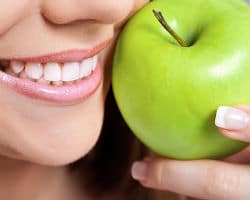
We all know that organic foods are good for us: they are free from the harmful pesticides that are routinely sprayed onto most crops. However, not many people know that eating organic could also be better for their teeth.
Organic foods are richer in the vitamins and minerals that are needed for healthy teeth. Many commercially grown non-organic foods are forced to grow rapidly beyond their normal sizes by the use of artificial fertilizers. Although non-organic fruits might be bigger and look more perfect, don’t be fooled by appearances! They actually contain fewer of the nutrients needed to keep your mouth healthy.
Calcium in Organic Foods Builds Strong Teeth
The calcium found in milk, cheese, and yogurt is essential for building strong, healthy teeth. However, intensive cattle farming techniques could be depleting calcium from the milk we drink. In 2005, the Soil Association reported that organic milk contains more vitamins and minerals than non-organic milk. Organically reared cows eat a healthy, natural diet of grass, which provides them with all the vitamins they need to make nourishing, calcium-rich milk that protects your bones and teeth.
Organic Fruits and Vegetables Help Promote Healthy Gums
Healthy teeth depend upon healthy gums to keep them firmly rooted in place. The health of your gums can be compromised if you don’t have enough vitamin C in your diet. Both organic and non-organic foods are a source of vitamin C, but did you know that organic foods contain substantially more vitamin C than non-organic ones? Research by scientists at the University of Newcastle in the UK showed that organic carrots, potatoes, apples, and peaches contain up to 20% more vitamin C than their non-organic counterparts.
Processed Organic Food
Eating fruit and vegetables is essential for dental health, with organic varieties offering the greatest benefits. But what about the other organic products that are filling up the shelves in our stores? Are they significantly healthier than the non-organic snacks they are replacing? Although organic processed foods offer some advantages, they are not always good for your teeth.
Beware of organic sodas, organic candies, and organic gum. Organic sweet treats are usually sweetened with sugar rather than artificial sweeteners. While there are some reasons why sugar is preferable to a chemically sweet additive, eating too much sugar is one of the main causes of tooth decay.
Almost all dentists agree that it is best to cut out soda altogether, whether it is organic or not. Instead, sip organic herbal tea with no added sugar, which will keep both your taste buds and your teeth happy.
Organic Foods and Dental Health: The Verdict
To be sure that you are treating your teeth well, you should buy organic wherever possible. Remember, however, that just being organic doesn’t mean that a food is good for your teeth. Organic honey, sugar, and syrups will still cause tooth decay if eaten in excess, although you can minimize the damage by brushing your teeth immediately after eating.
The most important dietary advice for keeping your teeth healthy is to eat a variety of nutrient-rich, low-sugar foods. Where you have the option, always choose an organic product over the non-organic version – your teeth will be grateful for the extra nutrients that organic foods provide.
Read More: Is Buying Organic Worth It?
Guest post contributed by Robert Anders, a freelance writer who currently writes for RockCenter Ortho , where you can learn more about the Manhattan Invisalign braces.
Sources
Soil Association (2005) The nutritional benefits of organic milk – a review of the evidence
Brandt K, Leifert C, Sanderson R, Seal CJ (2011) Agroecosystem management and nutritional quality of plant foods: The case of organic fruits and vegetables
http://dx.doi.org/10.1080/07352689.2011.554417










